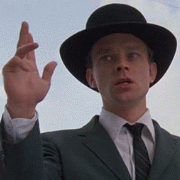|
BravestOfTheLamps posted:You seem to have imagined some instance of me expressing "tabloid interest" in the author. You snarkily interjected in a discussion about the role of the author's intent in criticism to feign ignorance about what I meant when I said that you should evaluate the text on its own merits rather than hypothesizing about whether or not the author personally succeeded or failed. Apologies for misinterpreting that.
|
|
|
|

|
| # ? May 22, 2024 16:42 |
|
sometimes, when I go to the book store, Umberto Eco books are in the 'literary fiction' section and sometimes, at another bookstore, they are in the 'historical fiction' section. HELP
|
|
|
|
I am pretty sure there are no bookstores that make that distinction actually
|
|
|
|
serves you right for buying books instead of just reading the wikipedia summaries
|
|
|
|
there is one in Oregon I went to not but a few weeks ago and this I swear on my forums platinum
|
|
|
|
my bony fealty posted:there is one in Oregon I went to not but a few weeks ago and this I swear on my forums platinum Was it Portland Sounds like Portland
|
|
|
OscarDiggs posted:Maybe we should have a "What is literary criticism" thread and/or post. I know I for one have very little idea of what it is, or how it differs from regular criticism. start here https://www.amazon.com/Literary-Theory-Introduction-Terry-Eagleton/dp/0816654476 then stop because, as Eagleton will teach you, marxist criticism is the only valid approach to literary analysis Generally the idea is you are using some sort of theoretical lens (marxism, feminism, etc) to analyze a work of literature and evaluate it from that perspective and according to that set of criteria. So, for example, it's relatively worthless for me to say that I think Wuthering Heights sucks, but it is useful to apply a feminist critical lens and argue that Wuthering Heights perpetuates toxic notions of masculinity, femininity, and romantic love. Conversely, it isn't too useful for someone to reply to me with "gently caress you, I love Wuthering Heights, it's awesome " but it would be useful to make the counter-argument that Wuthering Heights is intended as a deconstruction of those toxic notions, not a romanticization of them. (Please note that I haven't read Wuthering Heights in like twenty years and barely even remember it, those examples are purely hypothetical arguments). Contrast that approach with, say, a book review, which generally imagines a hypothetical reader and then tells that reader whether or not they might like the book, and why or why not. That's not really what you're doing with a literary analysis, or least usually not the primary purpose. A book review of Bridget Jones' Diary might just tell you whether the book was engaging, entertaining, etc; an analytical critique might instead look at how the book achieves the effect of being entertaining, or at what the book's popularity told us about feminism in modern culture. (I haven't read Bridget Jones' Diary either; again, hypothetical example). Take all the above with a grain of salt because it's also been about twenty years since I read Terry Eagleton. I'm too old for this poo poo. Hieronymous Alloy fucked around with this message at 19:58 on Sep 12, 2017 |
|
|
|
|
The issue is not every book fits cleanly into a genre. Most people discuss genres as a description of things in a book, does it have spaceships=sci-fi, does it have magic=fantasy. While that's often useful, especially for marketing people, what is in many ways more important is what books and scenes influenced the book to be written. Let's take a look at some books that were influence by a different scene than the genre they have been placed into. Harry Potter for instance while being a staple of YA fantasy debatable the formative work of the genre wasn't written from the fantasy scene and was more inspired by classic novels which was part of why it felt like a breath of fresh air for many. Or lets go to the Peter Grant books which are placed in Urban Fantasy...but owe as much to Urban Fantasy as they do police procedural, so where should they go in a book store fantasy? or with the other police procedural books? both? You can also have a book that's heavily influenced from the past such as the Charles E. Gannon books where he goes well I havn't read sci-fi in like 30-40 years, which yes his books read like they are from the 60s but with modern editing it's somewhat jarring to realize his stuff was written so recently. While PNR is a decently established sub-genre what about an author that wants to write a romance novel but also sci-fi like The Fallen Empire by Lindsay Buroker or Paradox by Rachel Bach, I guess they go in sci-fi even though they are really more suited towards fans of both Romance and Sci-fi but how many possible fans do they fail to reach because it can't really be cleanly placed right in front of their face saying read me. A good portion of the time when a book is influenced by more literary works and marketers feel it would perform better being placed in front of that group of readers then it is called a literary work instead of sci-fi. They arn't saying it isn't a sci-fi or fantasy or whatever they are saying people who enjoy this group of books we feel are more likely to enjoy this book than you. just another posted:I'd love to read some examples because I'm guessing the success criteria are sufficiently ill-defined that a critic could make a plausible case in any direction depending on what they're trying to prove. Just talk to them about it at cons or read their blog. Here we go what did RP1 try to achieve, it was trying to be a giant love letter to the 80s and while I didn't like it and I know goons despite it. Plenty of people did like it and defend it even though they realized it was really trashy, it triggered that connection inside of them of nostalgia and make them feel good which is exactly what RP1 was trying to do, and what seemingly Armada failed to do.
|
|
|
|
Liquid Communism posted:Honestly, that's pretty much the norm in lit crit where the SF/Fantasy ghetto is concerned. I don't think this is necessarily true, but I think dipping one's toes into lit crit via a literature course or two, or a full undergraduate English major, can really reinforce the idea that literary criticism inherently looks down on "genre" works. The truth is that there's quite a lot of literary criticism about works with science fiction and fantasy elements, and that's not even counting criticism that specifically examines works categorized as genre fiction. Undergraduate literature courses tend to avoid genre fiction except in courses specifically focused on it, but that isn't because the whole of the scholarly community treats them as inferior or unacceptable to study. University creative writing courses also tend to look down on fantastical elements, but there are often good reasons for that. Sure, sometimes the professor or the other students automatically associate fantastical elements with lowbrow genre fiction. But sometimes it leads to a more useful question, which one of my professors in grad school brought up: what are you doing with the fantastical element that you couldn't do without it? What purpose does it serve in terms of story, theme, and character? Does it distract from that, or does it enhance it? And the truth is, with inexperienced writers, it much more often distracts than enhances. It takes a lot of work to write a great story, and adding on magic or science fiction on top just makes that work even harder unless you really know what you're doing with it.
|
|
|
|
Mel Mudkiper posted:
Is this a worthwhile distinction? Surely you have to accept some definition of what the novel is trying to achieve, no matter how nebulous, so you have some framework to engage with? Otherwise you'll end up complaining that the Chuckle Brothers lacks gravitas, or that Kazuo Ishigoro's visual comedy doesn't work. That's a strawman example, and there'll always be edge cases. But what's the problem in assigning broad categories to different types of novels?
|
|
|
|
Mel Mudkiper posted:Was it Portland worse....Ashland....it's a lovely little town though (just don't drink the weird gross water) serious posting: thanks for that list of lit crit reads on the last page, I am unfamiliar with all of those works except Said and I am wanting to learn more about academic lit crit, of which I know very little quote:University creative writing courses also tend to look down on fantastical elements, but there are often good reasons for that. Sure, sometimes the professor or the other students automatically associate fantastical elements with lowbrow genre fiction. But sometimes it leads to a more useful question, which one of my professors in grad school brought up: what are you doing with the fantastical element that you couldn't do without it? What purpose does it serve in terms of story, theme, and character? Does it distract from that, or does it enhance it? And the truth is, with inexperienced writers, it much more often distracts than enhances. It takes a lot of work to write a great story, and adding on magic or science fiction on top just makes that work even harder unless you really know what you're doing with it. I'm about the read Empire of the Atom which as I understand it is a
|
|
|
my bony fealty posted:
You might get better responses for this in the general book recommendations thread, but there are approximately a zillion modern adaptations of Xenophon's Anabasis.
|
|
|
|
|
Strom Cuzewon posted:Is this a worthwhile distinction? Surely you have to accept some definition of what the novel is trying to achieve, no matter how nebulous, so you have some framework to engage with? Otherwise you'll end up complaining that the Chuckle Brothers lacks gravitas, or that Kazuo Ishigoro's visual comedy doesn't work. Text is text
|
|
|
|
Mel Mudkiper posted:Text is text So the chuckle brothers are bad? Edit: Also you clearly don't believe that text is text because you literally just said that how a book is marketed is relevant to its genre classification. Strom Cuzewon fucked around with this message at 22:42 on Sep 12, 2017 |
|
|
|
HIJK posted:but if what I like is bad then what does that say about me as a person!!??!?!??!!!??!?! This is a
|
|
|
|
Silver2195 posted:This is a The idea that fiction reflects our morality is how we got evangelicals burning Harry Potter because it has witchcraft in it. Does that make every Potterhead a Satan-worshipping warlock? This is not difficult, what you like in fiction doesn't mean anything about who you are as a person, or else every reader of Stephen King should be locked up as a serial killer. Do not use fiction and books as an excuse for fascist thought-policing. For gently caress's sake. e: IN FACT this exact thought process is why we have to have Banned Books Week: https://en.m.wikipedia.org/wiki/Banned_Books_Week HIJK fucked around with this message at 22:36 on Sep 12, 2017 |
|
|
|
Calling a text "good" or "bad" is normative. Regardless of your intent, I don't think you can do that without saying something about how you ought to feel about the text, and by extension, about those who feel wrongly. What do you imagine the goal of passing a moral judgment on a text ("it's bad!") is supposed to be, otherwise? e. \/ Fair enough, but then again, you're still saying a certain class of people are fans of poorly written texts. Why aren't they fans of well-written texts? Are they not discriminating enough? Educated enough? Why not? Etc. I'm not saying it's bad or good, I'm just not sure if you can disentangle criticism of a text from criticizing its fans and detractors. just another fucked around with this message at 23:03 on Sep 12, 2017 |
|
|
|
just another posted:Calling a text "good" or "bad" is normative. Regardless of your intent, I don't think you can do that without saying something about how you ought to feel about the text, and by extension, about those who feel wrongly. There's a difference "this book is morally bad" and "this book is written badly [incompetently]." I don't know which one BotL is using but the difference does exist.
|
|
|
|
Even then, BotL is writing reviews here, not criticism in the academic sense. They're critical reviews, but not academic criticism, and those are very different things.just another posted:I'm not saying it's bad or good, I'm just not sure if you can disentangle criticism of a text from criticizing its fans and detractors. I don't think BotL intends to disentangle that, honestly. Strom Cuzewon posted:Edit: Also you clearly don't believe that text is text because you literally just said that how a book is marketed is relevant to its genre classification. Mel's drawing a distinction between marketing and communication about books and criticism. Ultimately I don't completely disagree with them on this: genre is much less relevant to criticism (at least of a specific text--there's something to be said for criticism of genre conventions, I think) than to marketing or just talking to people about taste and preferences. As for "text is text," when we're talking about literary criticism, we're not talking about "good" or "bad" in the first place. Criticism doesn't mean reviews in this context. For criticism, it doesn't matter what an author was trying to achieve with a text--it matters what the text actually does. And the fact that it doesn't achieve certain things is more or less relevant based on what it does achieve, or the critical lens you're viewing it through. Writing a review is very different, though, but even then I'd argue that the question is less, "Does the book do what it set out to do?" and more, "Does what the book achieves make it a book I'd recommend reading?" Slightly different framing, but I think it's an important difference. Harrow fucked around with this message at 23:08 on Sep 12, 2017 |
|
|
|
It's a fundamental difference. The former is begging you to erect strawmen while the latter is asking you to focus on the text itself.
|
|
|
|
speculative fiction, as i was taught to call it in high school, has fallen victim to authors playing it safe to protect their work's marketability. the whole point of the genre was always to isolate specific problems in contemporary society and deal with them in a rarefied and entertaining environment, but while genre authors are constantly trying to outdo themselves in edginess and gnarly deaths and rapes-per-page rate, actual social commentary is sorely lacking. WOMEN ARE AN ABUSED DEMOGRAPHIC shows up in every work, but there is never any attempt to deal with the specific ways in which women are abused beyond the inevitable rape scenes. there are no fantasy novels about sex trafficking, or the full complexities of an abusive relationship, or learning to live in an arranged marriage, or coming out as transgender, or being the single mother of a daughter in a patriarchal society, or being expected to care for ailing family members, or any of the problems that women in the real world deal with every single day. there are just endless male authors writing rape scenes, usually obviously with one hand, and patting themselves on the back for being progressive and dealing with real issues. feminism is just the obvious example here, but of course it's not the only one. i'm sure patrick rothfuss genuinely thought he was writing a hard-hitting look at the realities of living in poverty and being
|
|
|
|
the old ceremony posted:. WOMEN ARE AN ABUSED DEMOGRAPHIC shows up in every work, but there is never any attempt to deal with the specific ways in which women are abused beyond the inevitable rape scenes. there are no fantasy novels about sex trafficking, or the full complexities of an abusive relationship, or learning to live in an arranged marriage, or coming out as transgender, or being the single mother of a daughter in a patriarchal society, or being expected to care for ailing family members, or any of the problems that women in the real world deal with every single day. there are just endless male authors writing rape scenes, usually obviously with one hand, and patting themselves on the back for being progressive and dealing with real issues. The last two Hugo winners were written by a woman who is also a person of color, and are about many of the things you talk about in your first paragraph, such as feminism, the exploitation of the female body, the exploitation of the black body, overcoming societal programming and self-actualization, and the way this is passed down from mother to daughter. But don't let me interrupt you, you're on quite a roll.
|
|
|
|
okay, jemisin exists. i don't like her work, but i like her - she is doing important stuff for the genre just by existing and i'm glad she's getting acclaim and success. now can you name a second female author of colour dealing with real-world issues who enjoys widespread acclaim and success? not just a few short stories published in a small-scale magazine run by sympathetic allies with no money, or a minor award with no prize and not much publicity - i'm talking major awards, contracts, sales.
|
|
|
|
this is getting out of the ground covered by sf/f and into the politics of the publishing industry itself, but the two are inextricable i guess. one black female face in a sea of white men is not representation. i didn't think i'd have to explain that, but i guess this is the book barn
|
|
|
|
Nnedi Okorafor is pretty great and she won a Hugo for something recently iirc, I'm sure there's more but idk off the top of my head But yes obviously SFF has for a long time been a white-male dominated field, this we know. I mean it's an industry struggling with fuckin Vox Day and his ilk, any progress is better than none 
|
|
|
|
the old ceremony posted:okay, jemisin exists. i don't like her work, but i like her - she is doing important stuff for the genre just by existing and i'm glad she's getting acclaim and success. Not a person of color, but Suzanne Collins otherwise fits the bill.
|
|
|
|
You know something's gone wrong when fantasy, a genre that can theoretically be about absolutely anything, is mostly about the same thing over and over again. There's a sort of ghetto effect where people who only ever read genre fiction go on to write more genre fiction and the people who only read those books go to write their own and so on and so on. Fantasy as a whole has only become more incestuous and filled with authors like Sanderson who can only really blindly imitate the trappings of books that were already subpar imitations of something that came before. An obsession with worldbuilding or magic systems or whatever the crap is a symptom of this. It's like watching someone trying to run fast by wearing Usain Bolt's old shorts instead of actually training for a sprint.
|
|
|
the old ceremony posted:okay, jemisin exists. i don't like her work, but i like her - she is doing important stuff for the genre just by existing and i'm glad she's getting acclaim and success. There aren't many female authors winning awards in fantasy period, never really have been. LeGuin would meet all your criteria except "of color." Almost all her major characters have been "of color," though, depending on how you define that (is a character with brown skin a "Black Man" if they live in a fantasy world where skin color doesn't have those connotations it has in ours?) the old ceremony posted:modern sf/f hasn't produced a 1984 or an earthsea for a very, very long time, and i don't trust any of the current crop to do so any time soon d'oh ok you covered her Well, the Wrinkle in Time movie is coming out soon with a female black director and Oprah in a starring role
|
|
|
|
|
the old ceremony posted:speculative fiction, as i was taught to call it in high school, has fallen victim to authors playing it safe to protect their work's marketability. the whole point of the genre was always to isolate specific problems in contemporary society and deal with them in a rarefied and entertaining environment, but while genre authors are constantly trying to outdo themselves in edginess and gnarly deaths and rapes-per-page rate, actual social commentary is sorely lacking. WOMEN ARE AN ABUSED DEMOGRAPHIC shows up in every work, but there is never any attempt to deal with the specific ways in which women are abused beyond the inevitable rape scenes. there are no fantasy novels about sex trafficking, or the full complexities of an abusive relationship, or learning to live in an arranged marriage, or coming out as transgender, or being the single mother of a daughter in a patriarchal society, or being expected to care for ailing family members, or any of the problems that women in the real world deal with every single day. there are just endless male authors writing rape scenes, usually obviously with one hand, and patting themselves on the back for being progressive and dealing with real issues. This is a good post and it outlines excellently the shape of the problem. Unfortunately the only way to fix it is to get more authors that have the knowledge and sophistication to understand these dynamics, and we have like, 2.
|
|
|
|
ZeroCount posted:You know something's gone wrong when fantasy, a genre that can theoretically be about absolutely anything, is mostly about the same thing over and over again. There's a sort of ghetto effect where people who only ever read genre fiction go on to write more genre fiction and the people who only read those books go to write their own and so on and so on. Fantasy as a whole has only become more incestuous and filled with authors like Sanderson who can only really blindly imitate the trappings of books that were already subpar imitations of something that came before. What's always been weird to me are the fans who discuss the magic systems as if they matter at all to the story or are somehow a selling point. It's often used to justify another aspect of the writing being weak, like you might here someone say, "The characters are pretty two dimensional, but the magic system is fascinating." As others have said, a setting isn't a story. World building isn't a conflict. A magic system isn't compelling writing and it can't make up for other areas where the author fails. For all the imitation of Tolkien that fantasy is, they miss the fact that magic is the least defined aspect of his world. When it's explicit, it's rarely more than a sword lighting up to warn the adventurers that evil is nearby and usually it's no more than some manifestation of nature. You have the ring, but even that is sort of nebulous in its capabilities. HIJK posted:but if what I like is bad then what does that say about me as a person!!??!?!??!!!??!?! I think this is grossly tied into capitalism, fandom, and identity. There's this trend where if you like something, you're supposed to consume every aspect of it. Like the novel? By the comic adaptation. Enjoy an author? Subscribe to his podcast and contribute to his Patreon. Did you hear he's going to run a kickstarter for a board game version of his book? Better slap down $100 on that too, $150 if you want all the limited edition pieces. And get a nerd culture box subscription while you're at it. You'll get weakly deliveries of low quality children's toys based on your favorite characters. If the thing you like doesn't have much in the way of literary value or depth, then it feels like a personal attack on you even though you didn't create it. But you have been made to feel like you own a stake in it because it tied it to multiple aspects of your life. It makes people react violently when someone says, "No, this thing has multiple objective flaws and is not deserving of the praise it's been receiving," because what they're hearing is, "You have objective flaws and are not deserving of the praise you have been receiving."
|
|
|
|
the old ceremony posted:okay, jemisin exists. i don't like her work, but i like her - she is doing important stuff for the genre just by existing and i'm glad she's getting acclaim and success. Octavia Butler and Yoon Ha Lee (identifies as a trans man) come to mind, but I'm not disagreeing with you that it's a white male dominated field. I also agree that it needs to be broader in scope. Your post was just weird because it asserted that this stuff doesn't exist, when in fact it's been dominating the awards for the last couple of years.
|
|
|
|
Atlas Hugged posted:What's always been weird to me are the fans who discuss the magic systems as if they matter at all to the story or are somehow a selling point. It's often used to justify another aspect of the writing being weak, like you might here someone say, "The characters are pretty two dimensional, but the magic system is fascinating." As others have said, a setting isn't a story. World building isn't a conflict. A magic system isn't compelling writing and it can't make up for other areas where the author fails. I assume someone like Sanderson would say that he isn't trying to imitate Tolkien; codified magic systems are for stories where the protagonists often use magic to solve problems, unlike in LotR where Gandalf isn't even around most of the time.
|
|
|
|
In Brandon Sanderson's books, the magic systems literally *are* the plot, because all of his books are mysteries where the mystery is "how does the magic system work?" This is every bit as dumb as it sounds.
|
|
|
|
mystes posted:In Brandon Sanderson's books, the magic systems literally *are* the plot, because all of his books are mysteries where the mystery is "how does the magic system work?" And it makes it a big slog to get through. If you want to read actual stories about fantasy then you are poo poo out of luck. Atlas Hugged posted:I think this is grossly tied into capitalism, fandom, and identity. There's this trend where if you like something, you're supposed to consume every aspect of it. Like the novel? By the comic adaptation. Enjoy an author? Subscribe to his podcast and contribute to his Patreon. Did you hear he's going to run a kickstarter for a board game version of his book? Better slap down $100 on that too, $150 if you want all the limited edition pieces. And get a nerd culture box subscription while you're at it. You'll get weakly deliveries of low quality children's toys based on your favorite characters. I hypothesize that this ties into the desire to reduce fantasy worlds to rote encyclopedias. The types that go in for this stuff are the types who want to reduce stories and characters to something plastic. Consumerism is cheap and very, very easy to copy. It doesn't challenge you and fantasy fans for the most part don't want to be challenged which is how they get conned by a hack like Rothfuss so easily. They want it to be this way and they don't want anything that's coherent or interesting, probably because you can't reduce coherent and interesting to a trading card game very easily. And of course by making books into cheap plastic poo poo it encourages the delusion that writing is easy and you don't have to work very hard at it.
|
|
|
|
I'm reminded of this Freddie deBoer post:quote:This morning I was browsing The Atlantic and I was struck by the degree to which I just expect all of our cultural criticism to function as a checklist for socially liberal politics ó knowing when I sit down to read a piece on a movie or book or music, particularly when addressing some sort of controversy, that such a piece will undertake an obligatory exploration of the degree to which the art in question satisfies contemporary progressive political expectations. More, art and artists who are seen as symbolically satisfying the dictates of progressive social politics will be celebrated, and their supposed lack of critical respect will be complained about even if they are among the most celebrated artists on earth; conversely, art and artists who are seen as deficient in this regard will be denigrated, and their supposed abundance of critical respect will be complained about even if they are ritualistically criticized by every prominent publication on the internet.
|
|
|
|
HIJK posted:I hypothesize that this ties into the desire to reduce fantasy worlds to rote encyclopedias. The types that go in for this stuff are the types who want to reduce stories and characters to something plastic. Consumerism is cheap and very, very easy to copy. It doesn't challenge you and fantasy fans for the most part don't want to be challenged which is how they get conned by a hack like Rothfuss so easily. They want it to be this way and they don't want anything that's coherent or interesting, probably because you can't reduce coherent and interesting to a trading card game very easily. Don't forget that every fantasy story has to be at least a trilogy these days! The biggest Rothfuss fan I know is a college-level English professor and this mystified me for a long time until I realized, she wants cheap hacky escapist bullshit. Maybe because she spends much of her working time in the academic/literary world, I dunno. But fantasy especially seems to excel at providing the literary equivalent of 4-chord pop music, and in droves. It's like superhero movies, they're all the same and they all suck. Now if you'll excuse me, I'll be over here reading Jack Vance and pretending I'm better than those other genre fans...
|
|
|
|
just another posted:I'm reminded of this Freddie deBoer post: Sorry that you can't ignore real problems in society like you used to be able to. How does it feel being like everyone else? Guess what, cultural criticism has always come from a political perspective, it's just that the perspective is no longer "we don't want to talk about this stuff."
|
|
|
|
my bony fealty posted:Don't forget that every fantasy story has to be at least a trilogy these days! I can understand wanting cheap hackery, I used to watch Stargate SG1 religiously. There's nothing wrong with liking that stuff...what baffles me is how people delude themselves into thinking Rothfuss or people like him are good writers. Because they're not. I had an ex boyfriend who recommended the Rothfuss books to me and he got genuinely angry when I told him I wasn't very enthused about the story because the prose was bad. He was convinced Rothfuss was a fantastic writer and he was absolutely furious when I didn't agree. So yeah there's nothing wrong with cheap hackery but ffs how do people think it's good craft?
|
|
|
|
my bony fealty posted:Don't forget that every fantasy story has to be at least a trilogy these days! Yeah, I have no idea about the accuracy of this but I've heard that publishers are more likely to turn new fantasy authors away if their books are explicitly standalone or aren't marketed with 'sequel potential'. Everyone's looking for the next neverending series since that's what defines the genre now and makes all the cash.
|
|
|
|

|
| # ? May 22, 2024 16:42 |
|
uberkeyzer posted:Sorry that you can't ignore real problems in society like you used to be able to. How does it feel being like everyone else? Please don't ascribe the worst motives to me, thanks.
|
|
|



















